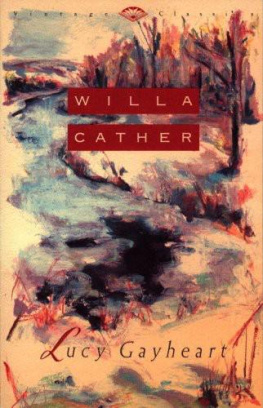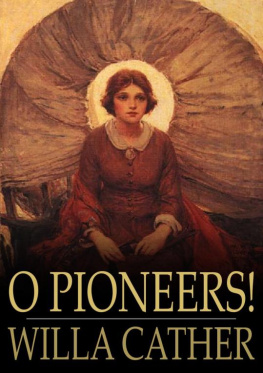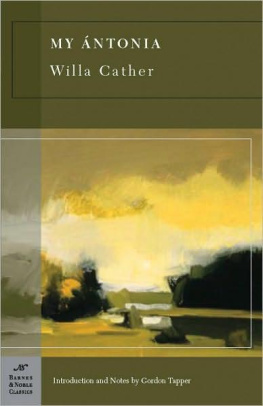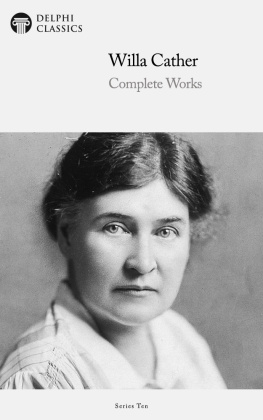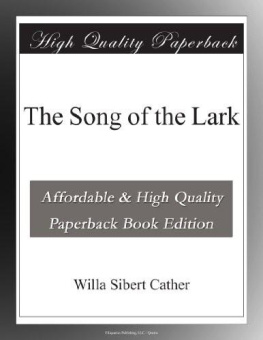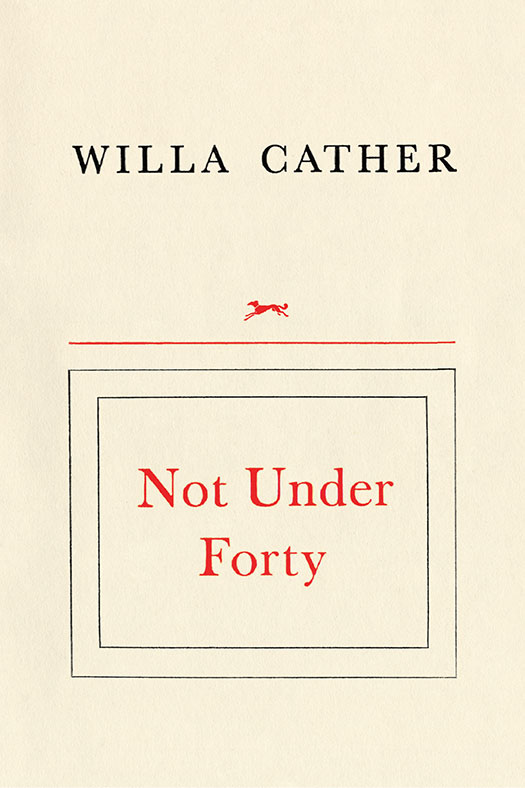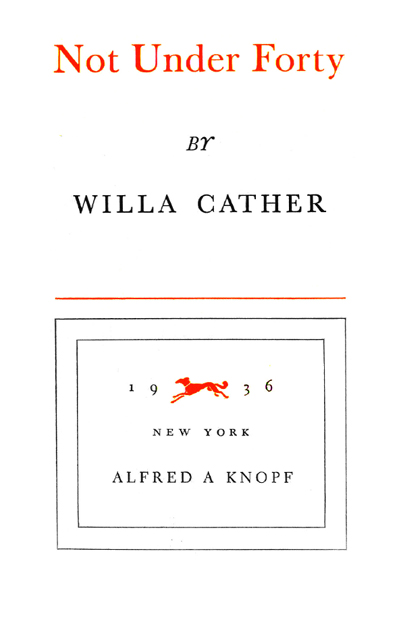THE WORKS OF
WILLA CATHER
Novels
ALEXANDER S BRIDGE 1912
O PIONEERS ! 1913
THE SONG OF THE LARK 1915
MY ANTONIA 1918
ONE OF OURS 1922
A LOST LADY 1923
THE PROFESSOR S HOUSE 1925
MY MORTAL ENEMY 1926
DEATH COMES FOR THE ARCHBISHOP 1927
SHADOWS ON THE ROCK 1931
LUCY GAYHEART 1935
Short Stories
YOUTH AND THE BRIGHT MEDUSA 1920
OBSCURE DESTINIES 1932
DECEMBER NIGHT 1933
Verse
APRIL TWILIGHTS 1923
Essays
NOT UNDER FORTY 1936
COPYRIGHT 1922, 1933, 1936 BY WILLA CATHER
ALL RIGHTS RESERVED. NO PART OF THIS BOOK MAY BE REPRODUCED IN ANY FORM WITHOUT PERMISSION IN WRITING FROM THE PUBLISHER, EXCEPT BY A REVIEWER WHO MAY QUOTE BRIEF PASSAGES IN A REVIEW TO BE PRINTED IN A MAGAZINE OR NEWSPAPER.
PUBLISHED NOVEMBER 23, 1936
eISBN: 978-0-307-83140-8
v3.1_r1
PREFATORY NOTE
The title of this book is meant to be arresting only in the literal sense, like the signs put up for motorists: ROAD UNDER REPAIR, etc. It means that the book will have little interest for people under forty years of age. The world broke in two in 1922 or thereabouts, and the persons and prejudices recalled in these sketches slid back into yesterdays seven thousand years. Thomas Mann, to be sure, belongs immensely to the forward-goers, and they are concerned only with his forwardness. But he also goes back a long way, and his backwardness is more gratifying to the backward. It is for the backward, and by one of their number, that these sketches were written.
T HE A UTHOR
CONTENTS
A CHANCE MEETING
I
It happened at Aix-les-Bains, one of the pleasantest places in the world. I was staying at the Grand-Htel dAix, which opens on the sloping little square with the bronze head of Queen Victoria, commemorating her visits to that old watering-place in Savoie. The Casino and the Opera are next door, just across the gardens. The hotel was built for the travellers of forty years ago, who liked large rooms and large baths, and quiet. It is not at all smart, but very comfortable. Long ago I used to hear old Pittsburghers and Philadelphians talk of it. The newer hotels, set on the steep hills above the town, have the fashionable trade; the noise and jazz and dancing.
In the dining-room I often noticed, at a table not far from mine, an old lady, a Frenchwoman, who usually lunched and dined alone. She seemed very old indeed, well over eighty, and somewhat infirm, though not at all withered or shrunken. She was not stout, but her body had that rather shapeless heaviness which for some detestable reason often settles upon people in old age. The thing one especially noticed was her fine head, so well set upon her shoulders and beautiful in shape, recalling some of the portrait busts of Roman ladies. Her forehead was low and straight, her nose made just the right angle with it, and there was something quite lovely about her temples, something one very rarely sees.
As I watched her entering and leaving the dining-room I observed that she was slightly lame, and that she utterly disregarded it walked with a quick, short step and great impatience, holding her shoulders well back. One saw that she was contemptuously intolerant of the limitations of old age. As she passed my table she often gave me a keen look and a half-smile (her eyes were extremely bright and clear), as if she were about to speak. But I remained blank. I am a poor linguist, and there would be no point in uttering commonplaces to this old lady; one knew that much about her, at a glance. If one spoke to her at all, one must be at ease.
Several times in the early morning I happened to see her leave the hotel in her motor, and each time her chauffeur brought down and placed in the car a camp chair, an easel, and canvases and colour boxes strapped together. Then they drove off toward the mountains. A plucky old lady, certainly, to go sketching in that very hot weather for this was in the latter part of August 1930, one of the hottest seasons Aix-les-Bains had ever known. Every evening after dinner the old lady disappeared into the lift and went to her own rooms. But often she reappeared later, dressed for the opera, and went out, attended by her maid.
One evening, when there was no opera, I found her smoking a cigarette in the lounge, where I had gone to write letters. It was a very hot night, and all the windows were open; seeing her pull her lace shawl closer about her shoulders, I went to shut one of them. Then she spoke to me in excellent English:
I think that draught blows out from the dining-room. If you will ask the boy to close the doors, we shall not feel the air.
I found the boy and had the doors closed. When I returned, the old lady thanked me, motioned to a chair at her side, and asked if I had time for a cigarette.
You are stopping at Aix for some time, I judge? she asked as I sat down.
I replied that I was.
You like it, then? You are taking a cure? You have been here before?
No, I was not taking a cure. I had been here before, and had come back merely because I liked the place.
It has changed less than most places, I think, she remarked. I have been coming here for thirty-five years; I have old associations with Aix-les-Bains. Besides, I enjoy the music here. I live in the South, at Antibes. You attend the Grand-Cercle? You heard the performance of Tristan and Iseult last night?
I had not heard it. I told her I had thought the evening too frightfully hot to sit in a theatre.
But it was no hotter there than anywhere else. I was not uncomfortable.
There was a reprimand in her tone, and I added the further excuse that I had thought the principals would probably not be very good, and that I liked to hear that opera well sung.
They were well enough, she declared. With Wagner I do not so much care about the voices. It is the orchestra I go to hear. The conductor last night was Albert Wolff, one of our best Kapellmeister.
I said I was sorry I had missed the opera.
Are you going to his classical concert tomorrow afternoon? He will give a superb rendering of Ravels La Valse if you care for modern music.
I hastily said that I meant to go.
But have you reserved your places? No? Then I would advise you to do so at once. The best way here is to have places for the entire chain of performances. One need not go to all, of course; but it is the best way. There is little else to do here in the evening, unless one plays at the gaming tables. Besides, it is almost September; the days are lowering now, and one needs the theatre. The old lady stopped, frowned, and made an impatient gesture with her very interesting hand. What should I have said then? Lowering is not the word, but I seldom have opportunity to speak English.
You might say the days are growing shorter, but I think lowering a very good word.
Mais un peu potique, nest-ce pas?
Perhaps; but it is the right kind of poetic.
And by that you mean?
That its not altogether bookish or literary. The country people use it in some parts of England, I think. I have heard old-fashioned farmers use it in America, in the South.
The old lady gave a dry little laugh. So if the farmers use a word it is quite safe, eh?
Yes, I told her, that was exactly what I meant; safe.


